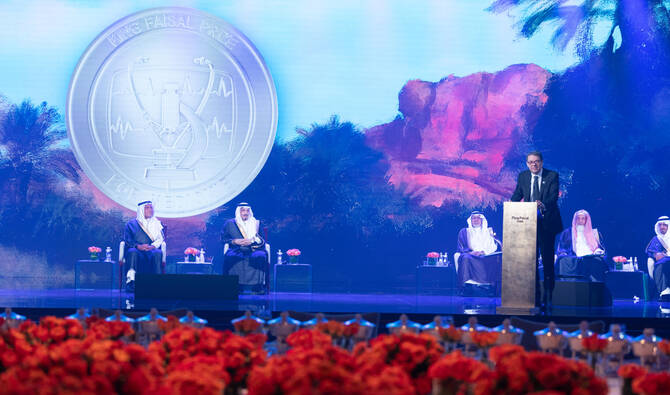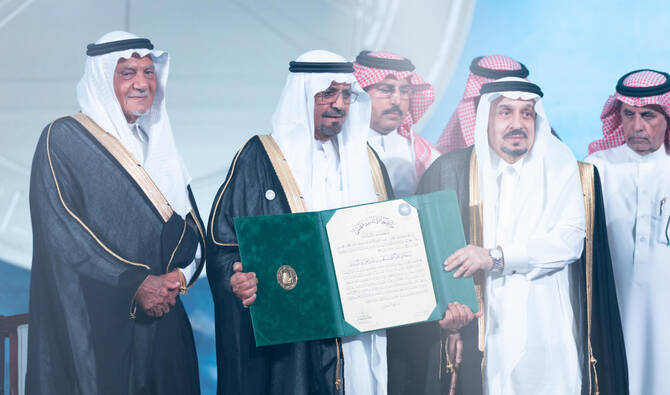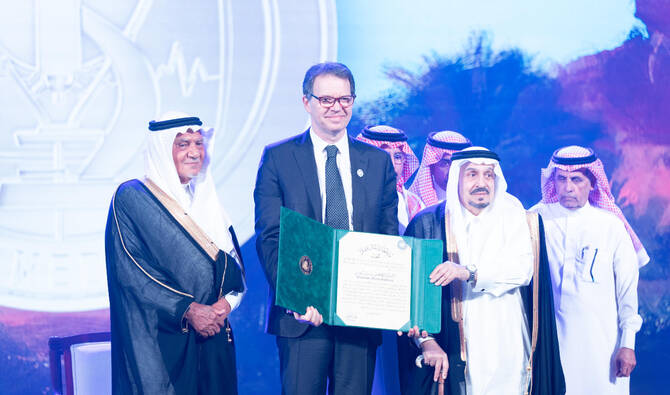RIYADH: The King Faisal Prize ceremony, held on Monday night under the patronage of King Salman in Riyadh, honored six distinguished laureates whose contributions have significantly advanced their fields and enriched humanity.
Held under the auspices of King Salman, Riyadh Gov. Prince Faisal bin Bandar handed over the awards to laureates at the event’s 47th edition.
Several princes, senior government officials, academics and scientists attended the ceremony at Prince Sultan’s Grand Hall at the Al-Faisaliah Center.
Prince Turki Al-Faisal, the chairman of the King Faisal Center for Research and Islamic Studies, thanked the dignitaries for attending and congratulated the laureates.
Scholars and experts in service to Islam, Islamic studies, medicine, and science gathered in the Saudi capital to celebrate excellence, knowledge, and service.
This year’s Service to Islam Prize was awarded jointly to two laureates from Saudi Arabia. The Tebyan Qur’an Project by Liajlehum Association for Serving People with Disabilities was recognized for developing the world’s first complete Qur’anic interpretation in sign language, making the sacred text accessible to the deaf community and promoting inclusivity in Islamic education.
The second laureate, Sami Abdullah Almaqlouth, was honored for his outstanding efforts in mapping and preserving historic Islamic sites through his work at the General Authority for Survey and Geospatial Information. His documentation supports cultural preservation and public awareness of Islamic heritage.
The Islamic Studies Prize, awarded for archaeological studies in the Arabian Peninsula, was also shared between two scholars. Prof. Saad Abdulaziz Alrashid, a leading Saudi archaeologist, was recognized for his foundational contributions to the study of Islamic inscriptions and archaeological heritage. His work has laid the groundwork for a new generation of scholars and brought international attention to the region’s historic richness.
Prof. Said Faiz Alsaid, another prominent Saudi figure in the field, was honored for his comparative studies of Arabian epigraphy and his contributions to decoding the ancient civilizations of the peninsula, bridging pre-Islamic history with Islamic archaeology.
The Arabic Language and Literature Prize on the topic of studies of identity in Arabic literature was withheld this year as the works nominated did not meet the standards of the selection committee.
The Medicine Prize, awarded for cellular therapy, went to Prof. Michel Sadelain, director of the Center for Cell Engineering at Memorial Sloan Kettering Cancer Center.
He was recognized for his pioneering work in CAR-T cell therapy, a breakthrough cancer treatment that involves genetically modifying immune cells to target and destroy tumors. His research has opened new possibilities in treating leukemia and other previously incurable diseases, marking a milestone in medical innovation.
The Science Prize, focusing on physics this year, was awarded to Prof. Sumio Iijima of Japan. Known as the father of carbon nanotubes, his 1991 discovery of these cylindrical nanostructures revolutionized the field of nanotechnology.
Carbon nanotubes are now used in cutting-edge applications across electronics, materials science, energy storage, and even biomedicine. His discovery laid the foundation for countless technological innovations in the 21st century.
The KFP was established in 1977, and was awarded for the first time in 1979 in three categories — service to Islam, Islamic studies, and Arabic language and literature. Two additional categories were introduced in 1981 — medicine and science. The first medicine prize was awarded in 1982, and in science two years later.
Since its inception in 1977 and its first awards in 1979, the KFP has recognized 301 laureates from 45 nationalities who have made outstanding contributions to Islam, knowledge, and humanity.
Each of the five prize categories is endowed with SR750,000 ($200,000), a 24-carat gold medal and a certificate signed by Prince Khalid Al-Faisal.
































